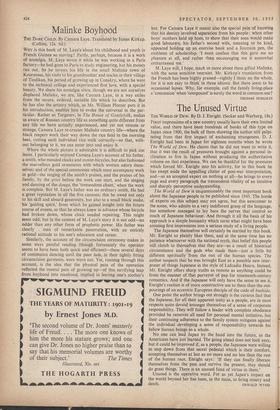Malinke Boyhood
THE DARK CHILD. By Camara Laye. Translated by James Kirkup. (Collins, 12s. 6d.) WHY is this book of M. Laye's about his childhood and youth in French Guinea so moving? Partly, perhaps, because it is a work of nostalgia. M. Laye wrote it while he was working in a Paris factory—he had gone to Paris to study engineering, but his money ran out. So he invests his life in the small Malinke town of Kouroussa, his visits to his grandmother and uncles in their village of Tindikan, his period of growing up in Conakry, where he went to the technical college and experienced first love, with a special beauty. We share his nostalgia since, though we are not ourselves displaced Malinke, we are, like Camara Laye, in a way exiles from the secure, ordered, sociable life which he describes. But he has also the artistry which, as Mr. William Plomer puts it in his introduction, enables him to evoke the universal in the par- ticular. Rather as Turgenev, in The House of Gentlefolk, makes us aware of Russian country life as something quite different from any life we have actually experienced, and yet not remote or strange, Camara Laye re-creates Malinke country life—where the black reapers work their way down the rice field in the morning heat, cutting each individual rice stalk correctly—so that, with- out belonging to it, we can enter into and enjoy it.
Where the whole picture is admirable it is difficult to pick out items. I particularly enjoyed Camara Laye's account of his father, a smith, who mended clocks and motor-bicycles, but also fashioned the marvellous gold ornaments with which women adorn them- selves; and of the special ceremonies which must accompany work in gold—the singing of the smith's praises, and the praises of his family, by the griot before the work can start, and the singing and dancing of the douga, the 'tremendous chant,' when the work is complete. But M. Laye's father was no ordinary smith. He had a great reputation in all the five cantons; this he owed not only to his skill and absurd generosity, but also to a small black snake, his 'guiding spirit,' from which he gained insight into the future course of events, so that he always knew in advance whose bicycle had broken down, whose clock needed repairing. This might seem odd; but in the context of M. Laye's story it is not odd—no odder than any other form of prophetic power. His father was clearly . man of remarkable penetration, with an entirely rational attitude to his son's education and career.
Similarly, the account of the circumcision ceremony makes in some ways painful reading (though fortunately the operator seems to have been both quick and efficient)—these several days of continuous dancing until the poor lads, in their tightly fitting circumcision garments, were worn out. Yet, running through this account, is the idea that the physical pain of the operation reflected the mental pain of growing up—of this terrifying leap from boyhood into manhood, implied in leaving one's Mother's hut. For Camara Laye it meant also the special pain of knowing that his destiny involved separation from his people: when other boys' mothers held up hoes, to show that their sons would make good labourers, his father's second wife, meaning to be kind, appeared holding up an exercise book and a fountain pen, the emblems of scholarship. 'I must confess that this gave me no pleasure at all, and 'rather than encouraging me it somewhat embarrassed me.'
M. Laye will, I hope, teach us more about these gifted Malinke, with the same 'sensitive restraint. Mr. Kirkup's translation from the French has been highly praised—rightly I think on the whole, for it is not easy to think in three idioms. But there seem to be occasional lapses. Why, for example, call the family living-place a 'concession' when 'compound' is surely the word in common use?
THOMAS HODGKIN


































 Previous page
Previous page